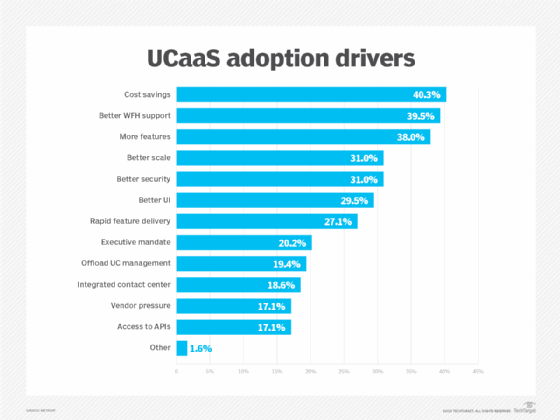How to evaluate top UCaaS providers and vendors of 2026
Organizations have many considerations to make when adopting UCaaS. Learn how to evaluate key capabilities from UCaaS providers, including AI, mobility, security and integrations.
Unified communications as a service has now become the predominant delivery model for enterprise communication and collaboration.
More than 90% of organizations have implemented UCaaS, and more than half use it as their only employee communications platform, according to Metrigy's "Workplace Collaboration MetriCast 2025" global study of 775 global organizations. While most organizations plan to keep their UCaaS spending flat through 2026, more than one-third of businesses are willing to pay more for advanced features.
Those who have already moved to UCaaS systems or are planning to do so are primarily motivated by the opportunity to save money by offloading operational management of cloud communications to a service provider. UCaaS providers control their own platform and are responsible for maintenance and upkeep, as well as end-user support if a problem arises.
The desire to better support remote work by eliminating the need to carry calls across a VPN into the enterprise network is another major driver for UCaaS adoption. An additional adoption driver is access to features UCaaS providers might offer, including integrated meetings, contact center and AI-driven enhancements for call management.
Leading UCaaS providers and vendors of 2026
When it comes to picking the right provider, buyers have many choices and factors to consider. Currently, there are at least 30 providers in the market, not including MSPs that resell and support UCaaS offerings. Leading providers that either offer their own native services or resell and support UCaaS from partners include the following:
- 8x8 Inc.
- AT&T.
- Avaya.
- Dialpad.
- Comcast.
- GoTo.
- Intermedia.
- Lumen.
- Microsoft.
- Mitel.
- Net2Phone.
- Nextiva.
- RingCentral.
- Verizon.
- Vonage.
- Webex by Cisco.
- Wildix.
- Zoom.

How UCaaS providers differ
While UCaaS platforms include standard features and capabilities, UCaaS providers differ in how they support them. There are several capabilities that set vendors apart from one another:
- Features. Some providers are focused on VoIP and calling. Others offer integrated video meetings, messaging and contact center functionality.
- Size and scope. This ranges from a focus on large companies with multinational support to one on smaller companies, often within limited geographies. Providers targeting larger enterprises are more likely to support bring-your-own-carrier options to help customers connect to the public switched telephone network through their existing Session Initiation Protocol trunking providers or to take advantage of best-in-region carriers to minimize telecom costs.
- Migration capabilities. Some providers offer seamless migration for existing hardware, such as telephones. Others require purchasing or leasing new phones and other infrastructure, including remote survivable gateways.
- Cost and flexibility. License costs vary across providers and by services included. For example, the costs for contact center features, 800 numbers and international long distance are different across providers. Some vendors offer more flexible a la carte licensing; others limit options to a few bundles.
- Mobility. Almost all providers offer a mobile app for their services. Some are now working closely with carrier partners to support the use of native dialers on iOS and Android devices.
- Messaging. Most providers now offer an integrated messaging app within their UC offering. Support for text messaging and Multimedia Messaging Service integration still varies.
- AI. As agentic and generative AI take the world by storm, UCaaS providers are rapidly differentiating themselves from one another by how quickly they can bring AI features to the table. Capabilities range include virtual assistants, advanced analytics, meeting summarization, translation and autocomposition for chat app messages.
- Resiliency. Most providers offer a minimum of four-nines (99.99%) availability, though many are now guaranteeing five-nines (99.999%) availability. That's the difference between about 52 minutes of unscheduled downtime per year and 5.2 minutes.
- Security and compliance. Providers often vary in their ability to offer features such as end-to-end encryption; single sign-on support; exporting and archiving of data, including call logs and messages; and support for standards such as ISO 27001 and SOC 2.
- Bundled services. Offerings from network service providers are likely to include WAN services with service-level guarantees. Over-the-top providers are reliant on the quality of the underlying network and might lack visibility into network performance.
- Industry- and role-specific products. Some providers have offerings designed for specific roles or types of companies. This could include tools to optimize sales management and analytics through AI or options to integrate calling platforms into business applications for CRM and appointment management, such as for a doctor's office.
- Integrations. Most UCaaS providers offer some level of integration with popular office productivity suites, such as email and calendar, with a few offering their own apps. More advanced providers not only have an extensive list of third-party application integrations but also offer APIs and collaboration tools to enable customers to create their own custom integrations as needed.
How to evaluate and choose the right provider
Evaluating and choosing the right provider requires careful analysis of each provider's capabilities versus customer needs. Typically, this starts with looking at the feature sets, price, availability and geographic reach.
It also means looking at different buying options, such as purchasing directly from a UCaaS provider or through a partner that might also provide management and network services as part of a packaged offering. Use the list above as a starting point to weigh each area of differentiation based on importance to your requirements.
Editor's note: This article was updated in February 2026 to refresh information and improve the reader experience.
Irwin Lazar is president and principal analyst at Metrigy, where he leads coverage on the digital workplace. His research focus includes unified communications, VoIP, video conferencing and team collaboration.






